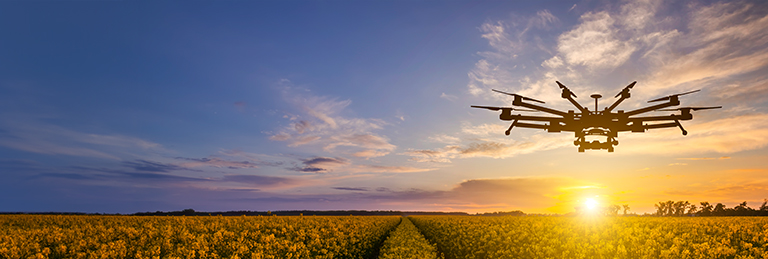Climate change is perhaps the greatest challenge which the agricultural sector, and the whole world and humanity, has ever met. We are faced with increasingly extreme, frequent and devastating climatic phenomena, but this is only the beginning if we fail to take concrete action.
The agricultural sector, in particular, is one of the largest producers of greenhouse gases: in fact, it is estimated that between a quarter and a fifth of atmospheric emissions come from agricultural operations. So we cannot think about the future of agriculture, and of the planet, without a concrete transformation of the industry. This involves the adoption of more efficient and sustainable practices that can, on the one hand, meet the needs of a constantly growing global population and, on the other, reduce its own impact on the environment.
But what measures is the sector putting into practice today to deal with this situation?
International experts and guests of the sixth episode of Global Trends, the BKT Network format dedicated to macro-themes and trends that influence world agriculture, talk about all of this. A tribute, moreover, to Earth Day which is celebrated on April 22nd.
First of all, the climate emergency requires the adoption of globally coordinated strategies, but at the same time the implementation of measures to fit the local context. It's a tricky issue, as suitable and effective regulation for one country could be ineffective in another. However, there are some universal policies which can help in this regard, for example incentives for farmers to adopt sustainable and beneficial practices for the environment and the soil, and encouraging farmers to limit tillage and use cover crops.
John Reilly, an economist in energy, environment and agriculture at the Massachusetts Institute of Technology, commented: “In addition to policies and regulations, we must not forget education, which is a very important tool to raise awareness among professionals in the sector on these issues. Then there is also the issue of animal agriculture and livestock farming, which we know is a major cause of methane emissions. So how do we do it? Changing cattle's diet can help reduce these emissions. Livestock farms aside, it is also possible to think of farmers and their land as a renewable energy resource. Farmland can be used to install solar panels or wind turbines, which could offset farmers' use of fuels, and even contribute significantly to a country's wider energy needs. It is also essential to limit and use nitrogen fertilizers more efficiently, thereby reducing emissions of nitrous oxide into the atmosphere. In this sense, precision agriculture and new technologies can really make a difference by providing professionals with more suitable tools to measure, verify and finally intervene by using these fertilizers at the right times and in the right quantities."
Extreme weather events are one of the effects of climate change that most impact agriculture today. We are talking, for example, of prolonged drought in summer periods, torrential rain and violent hailstorms.
How are countries and farmers responding to this phenomenon?
Providing a perspective for Italy is the journalist Lisa Bellocchi, president of the European Network of Agricultural Journalists: "Thanks to the help of public funding, hi-tech irrigation systems have been developed against drought in Italy, which make it possible to halve the use of water, as well as the installation of protective nets against hail. In collaboration with leading universities, new seed varieties have been developed which require less water and grow at higher temperatures. We can say that Italy has decided to combat climate change and its impacts on agriculture by focusing on three different areas: the use of technology, the training of farmers and the development of projects to store rainwater. Technology allows rational use of water, which can be stored through a network - currently under construction - of overflow basins, tanks and storage basins. As for training, Italy coordinates Fields, which is a leading project involving farmers and universities from 12 European countries. Funding of 1.5 billion Euro from the National Recovery and Resilience Plan is also on the way and will be solely for agro-climate-environmental projects."
Francesco Cavazza, a researcher at the Italian research center "Acqua Campus", part of the "Canale Emiliano Romagnolo" Irrigation Authority also intervened, providing interesting observations and information on Italian agriculture, analyzing in particular the issue of water and irrigation: “Acqua Campus is a cutting-edge hub dedicated to the development and transfer of innovation to companies operating in agriculture. However, we don't only do research into new technologies, we also study and monitor, observing different parameters such as climate and resources, rainfall, groundwater, soil moisture and much more besides. We recently conducted a study on rainfall and its impact on agriculture. Considering the region of Emilia-Romagna, in the North-East of Italy, we have seen that rainfall has changed not so much in terms of quantity, as in terms of frequency, becoming much more concentrated at certain periods of the year and thus creating drought problems in the summer months. Not only that, we have observed that this phenomenon leads to problems of leaching into the soil by nitrates and phosphates. To overcome this problem, it is possible to intervene by improving the fertilization of crops, using for example organic fertilizers and fertigation to avoid the loss of nutrients and use good practices such as cover crops."
From Italy to Ireland. Tom O'Dwyer, Head of the Signpost Programme Project at Teagasc ("Chògazz"), the Irish Agriculture and Food Development Authority commented: "In Ireland, the Government has committed, through the Climate Action Plan, to zero emissions by 2050, setting sector-specific targets: from transport to the energy industry and, of course, the same applies to agriculture. The Signpost Programme goes exactly in this direction. It is a programme that aims to reduce greenhouse gas emissions in the Irish agricultural sector, providing direct support to farmers and professionals in the agricultural industry through training and support for the adoption of sustainable technologies and good practices. It is an initiative supported today by over 50 partners, including the major associations and organizations in the sector and the reference institutions and will be instrumental in achieving the zero emission goals that Ireland has set itself. The Teagasc is working on several measures to mitigate the sector's impact on the environment, for example, by encouraging farmers to use fertilizers with less nitrogen dioxide.”








